Medical expert of the article
New publications
Preparations
Herpes suppositories
Last reviewed: 03.07.2025

All iLive content is medically reviewed or fact checked to ensure as much factual accuracy as possible.
We have strict sourcing guidelines and only link to reputable media sites, academic research institutions and, whenever possible, medically peer reviewed studies. Note that the numbers in parentheses ([1], [2], etc.) are clickable links to these studies.
If you feel that any of our content is inaccurate, out-of-date, or otherwise questionable, please select it and press Ctrl + Enter.
Today, about 90% of the world's population is infected with herpes virus types 1 and 2. The virus remains in the body for life, but special means can be used to help block its reproduction in the process of repeated relapse of the infection. Very popular drugs in modern medicine are suppositories for herpes.
Indications herpes suppositories
Herpes suppositories are usually used to treat rectal or urogenital forms of the disease. They are often prescribed to treat herpesvirus infection in children.
Under the influence of sufficient body temperature, rectal suppositories begin to melt. Due to this, their active substances get to the foci of infection faster. Almost all suppositories for herpes have an immunostimulating and antiviral effect, so they can quickly suppress active reproduction of the virus and increase local immunity.
Release form
There are very few unique drugs for treating herpes today, since all the products that can be found in the pharmacy are analogues. The most popular products include:
- Genferon.
- Viferon.
- Kipferon.
- Hexicon.
- Betadine suppositories.
- Galavit.
- Panavir.
- Polyoxidonium suppositories (during relapses).
This is what we will talk about in this article.
Genferon
It has an immunostimulating and antiviral effect. The following active ingredients can be found in the composition of the drug: recombinant human interferon, benzocaine and taurine. It is prescribed for the combined treatment of genital herpes.
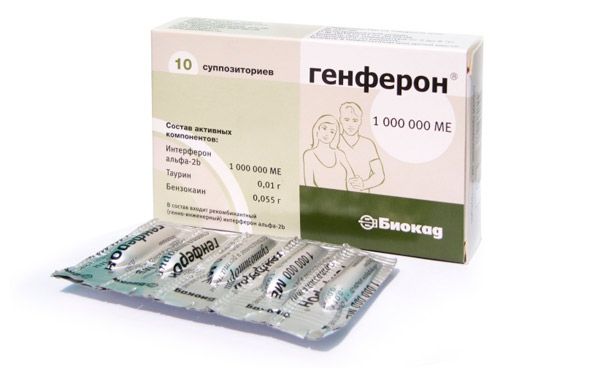
For the treatment of urogenital herpes in women, one suppository is prescribed intravaginally twice a day. The treatment lasts ten days. If the disease is chronic, the treatment lasts from one to three months at a dosage of one suppository every other day.
For the treatment of urogenital herpes in men, one suppository is prescribed rectally twice a day for ten days.
Patients who may have intolerance to at least one of the components of the drug are prohibited from using suppositories. In rare cases, patients may develop side effects to Genferon suppositories: allergic rashes, skin irritation and itching, headaches, thrombocytopenia, leukopenia, increased sweating and high body temperature.
 [ 3 ]
[ 3 ]
Viferon
Rectal suppositories that have immunostimulating and antiviral effects. The active substance in the suppositories is recombinant human interferon. Can be used to treat chronic herpes in children.
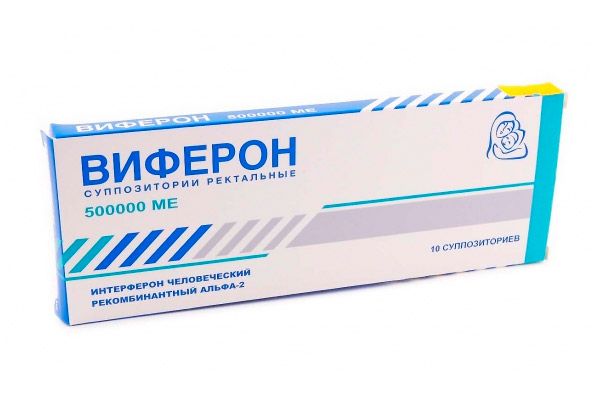
The standard dosage of Viferon for the treatment of herpes in adults and children is: one suppository twice a day (every 12 hours) for ten days. Suppositories are administered rectally. It is recommended to begin therapy with the appearance of the first symptoms: itching in the urogenital area, burning and redness of the skin.
Patients with interferon intolerance are prohibited from using the drug. It can be prescribed for the treatment of pregnant women from the 14th week. Rarely, some patients may experience various allergic reactions to the drug.
Kipferon
An antiviral drug that is often prescribed for the treatment of urogenital herpes. Increases local immunity. The suppositories contain active substances: interferon and plasma protein. It can also be prescribed for the treatment of chlamydia in women.
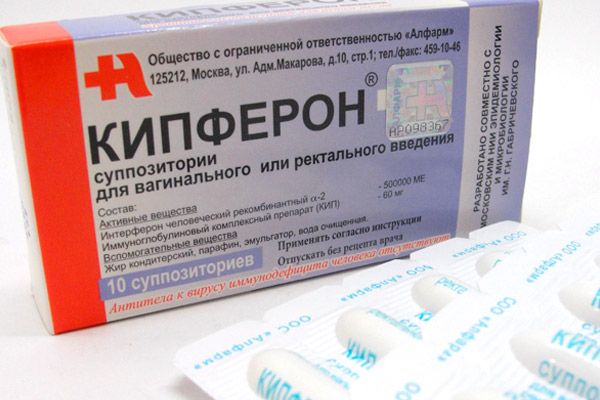
For the treatment of herpesvirus infection in women, suppositories are administered intravaginally, 1 suppository twice a day. For the treatment of men, the dosage is the same, but suppositories are administered rectally. As a rule, treatment lasts about ten days.
Pregnant women and nursing mothers are prohibited from taking Kipferon suppositories. The drug is contraindicated for patients with intolerance to the main components.
Hexicon
An antiseptic drug that is most often used in gynecology. The drug contains the active substance chlorhexidine bigluconate. It is active against many gram-positive and gram-negative bacteria: Ureaplasma spp., Treponema pallidum, Neisseria gonorrhoeae, Chlamydia spp., Bacteroides fragilis, Gardnerella vaginalis; some protozoa (Trichomonas vaginalis) and viruses (Herpes simplex type I and II).
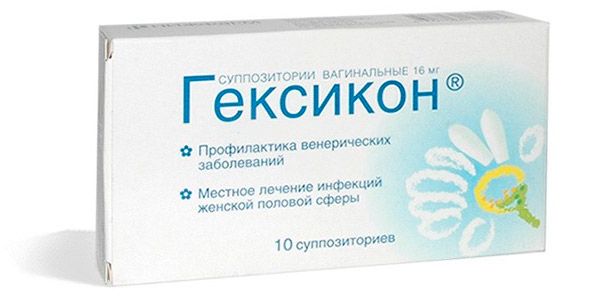
Hexicon suppositories can be used both for prevention and treatment of many urogenital diseases, including herpes. As a preventive measure, doctors recommend inserting one suppository intravaginally two hours after sexual intercourse. For treatment, insert one suppository twice a day for seven to ten days.
Patients with intolerance to chlorhexidine bigluconate are prohibited from taking the drug. There are no contraindications for the use of suppositories by pregnant women. Rarely, after insertion of the suppository, the patient may feel tingling, burning and itching in the urogenital area.
Betadine suppositories
A popular antiseptic drug in gynecology that has a disinfectant effect. The product contains povidone-iodine, which is its active substance. It is active in the fight against bacteria (Staphylococcus aureus, E. coli), herpes simplex viruses and some fungi (including Candida).
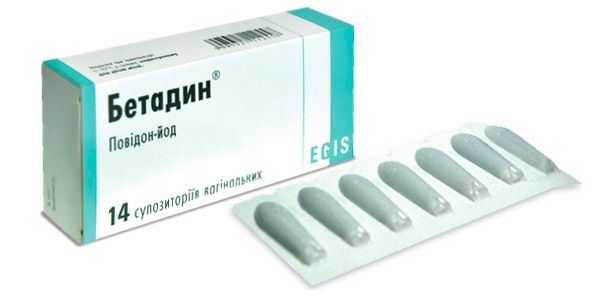
Before use, the suppository should be held under running water for some time to soften the preparation a little. It should be inserted intravaginally, deep enough, preferably before bedtime. The dosage for treating herpes is prescribed by the doctor individually. Usually, it is one suppository per day for seven days.
Patients with thyroid disorders, thyroid adenoma, Duhring's dermatitis, intolerance to the main component of the drug are prohibited from using Betadine suppositories. Also, the drug cannot be used to treat herpes in children and pregnant women. In rare cases, patients may experience some unpleasant side effects after administration of the drug: itching, irritation, hyperemia, burning, hypersensitivity.
Galavit
A popular drug for boosting immunity and treating urogenital herpes. One suppository contains 100 mg of sodium aminodihydrophthalazinedione, which is the active ingredient of the drug.
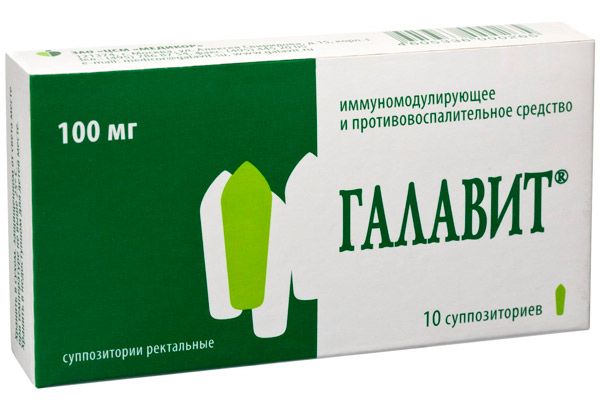
The dosage and duration of treatment are determined by the doctor individually, based on the severity of the disease and the patient's condition. Suppositories are administered rectally only. Before use, it is recommended to do a cleansing enema. The standard dose for herpes infection is as follows: first, two suppositories are administered once a day, and after the main symptoms disappear, 1 suppository once a day.
Pregnant women, as well as nursing mothers and patients with intolerance to sodium aminodihydrophthalazinedione are prohibited from using the drug. Allergic reactions may occur very rarely during therapy.
Panavir
An antiviral drug that includes plant components: Solanum tuberosum shoot extract (purified), hexose glycoside. Thanks to this, the product helps to increase the body's immunity. It is used in combination with other drugs for the treatment of genital herpes.
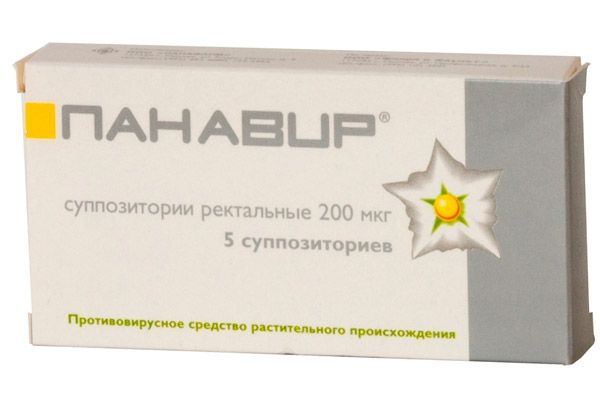
The dosage is prescribed by the doctor individually. It depends on the severity of the disease.
Patients with severe diseases of the spleen and kidneys, intolerance to the main substances included in the drug, should not use suppositories. They are also prohibited in childhood and for treatment during lactation. Very rarely, patients develop an allergy to Panavir.
Polyoxidonium suppositories for herpes recurrences
A drug for stimulating immunity and combating the herpes virus. The active substance that is part of the suppositories is polyoxidonium or azoximer bromide. Available in two forms: suppositories with 6 mg of the main component and with 12 mg of polyoxidonium. Often used to improve immunity in children and adults.
Suppositories are administered rectally and intravaginally. The treatment regimen, as well as its duration, is prescribed by the attending physician individually. Standard treatment for herpes involves administering one suppository once a day for three days, then taking a one-day break and resuming the treatment.
Pregnant women and breastfeeding mothers are contraindicated to use the drug. Patients with intolerance to the main component are prohibited from taking it.
Suppositories for genital herpes
All the products intended for the treatment of genital herpes can be divided into three main groups:
- Atypical nucleosides.
- Hexose glycosides.
- Drugs for stimulating immunity.
The first group is designed to block the process of reproduction of the herpes virus type I and II. It is very important to start treatment as early as possible, since atypical nucleosides are effective at an early stage of the disease. This group includes only ointments and tablets (Acyclovir, Zovirax, GlaxoSmithKline).
The most popular drug in the second group is Panavir suppositories. They are often prescribed for local or systemic treatment. Sold in pharmacies by prescription, and should be used only on the recommendation of a doctor.
Immunomodulators are the most popular means for treating genital herpes. A huge number of suppositories are produced: Viferon, Ridostin, Cycloferon, Polyoxidonium.
Rectal suppositories for herpes
Rectal suppositories for herpes have many advantages:
- Can be used at home, independently.
- The introduction is completely painless.
- The rectal method of administration promotes rapid absorption of active substances into the lymphatic system and blood.
- Very small amounts of the drug reach the liver.
- Does not have an irritating effect on the gastric mucosa.
- The therapeutic effect occurs much faster.
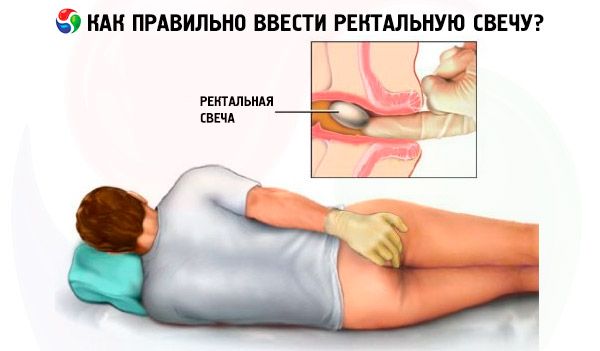
Pharmacodynamics
Let's consider the pharmacodynamics and pharmacokinetics of suppositories for herpes using the example of the popular drug "Genferon".
This drug is combined, so it has immunostimulating and antiviral properties. Recombinant human interferon, which is part of the suppositories, helps fight the herpes virus. It increases the activity of killers, phagocytes and T-helpers.
The drug also contains benzocaine and taurine. The first is an anesthetic. The second accelerates tissue regeneration.
Pharmacokinetics
After administration (rectally or intravaginally), Genferon begins to be absorbed into the mucous membrane and enters the tissues that surround it.
 [ 6 ]
[ 6 ]
Dosing and administration
Herpes suppositories are vaginal and rectal. As a rule, rectal forms are used to treat men and children, and vaginal forms are used to treat women. The course of therapy is determined by the attending physician. But, as a rule, one suppository is administered once or twice a day.
Use herpes suppositories during pregnancy
As a rule, herpes suppositories are not used for treatment in pregnant women, but since genital herpes is a rather severe and serious disease that can be transmitted from mother to child during childbirth, therapy is still necessary. The most popular and safe means for treatment today are Viferon suppositories. It can also be used to prevent viral diseases, as it increases immunity during pregnancy.
Viferon suppositories can be used starting from the 29th week of pregnancy and until the end of the gestational period. As a rule, they should be administered twice a day (morning and evening). The drug is taken for about five days, after which a short break is taken. The most optimal option for expectant mothers is Viferon No. 2.
Side effects herpes suppositories
Most often, patients do not experience any discomfort during treatment with genital herpes suppositories. In extremely rare cases, allergic reactions may occur, which can be easily overcome by simply stopping the drug.
 [ 10 ]
[ 10 ]
Storage conditions
Since suppositories often have a fatty base, they should be stored in a cool and dark place (temperature should not exceed +8 degrees). It is very important not to give the drug to small children.
 [ 15 ]
[ 15 ]
Shelf life
The shelf life is from two to three years. Do not use the candles after this period.
 [ 16 ]
[ 16 ]
Attention!
To simplify the perception of information, this instruction for use of the drug "Herpes suppositories" translated and presented in a special form on the basis of the official instructions for medical use of the drug. Before use read the annotation that came directly to medicines.
Description provided for informational purposes and is not a guide to self-healing. The need for this drug, the purpose of the treatment regimen, methods and dose of the drug is determined solely by the attending physician. Self-medication is dangerous for your health.

